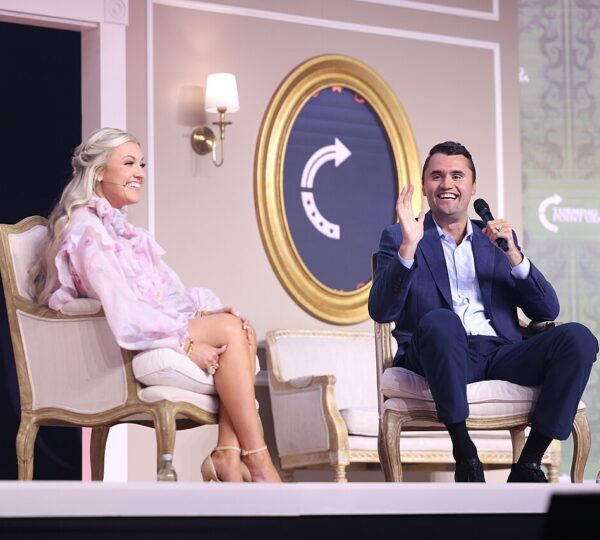It has been a little over two months since the tragic passing of public figure Charlie Kirk, an event that deeply affected his family, colleagues, and supporters. The loss of such a prominent figure leaves an enormous gap, both professionally and personally.
But in the wake of Charlie’s death, his wife Erika has stepped into a more visible leadership role, carrying on their shared mission and continuing the work of the organization they had built together.
For Erika, this period has been one of immense transformation. Not only is she now responsible for raising their two young children, but she is also stepping up to lead an organization that had previously been a joint effort.
The grief of losing her husband is immense, yet she carries on with incredible strength, now in the public eye more than ever. However, as often happens when someone enters the public spotlight during a time of grief, Erika has found herself the subject of increased online attention.
It’s heartbreaking to witness how public figures, especially those who are grieving, are often subjected to speculation and rumors that have no basis in truth. Recently, some corners of the internet have circulated unusual and unfounded claims about Erika, attempting to push speculative theories about her appearance and background. These claims, originating from certain groups known for promoting online misinformation, only add to the burdens she is already carrying.

The Online Speculation and Misinformation
Such speculation is not new. Throughout history, celebrities, politicians, and public figures have been the targets of similar rumors and theories. However, this specific brand of misinformation has taken a darker turn. The most recent theories surrounding Erika are not only baseless but also unnecessarily invasive.
These discussions have been fueled by groups that are notorious for spreading online misinformation about public figures, further complicating the grief Erika is going through.
It’s deeply troubling that, at a time when Erika should be receiving support and comfort from the public, she is instead facing unwarranted attention about her personal life. What’s more troubling is the fact that these discussions are often based on highly questionable methods.
For example, some of the claims circulating on social media have involved the discredited practice of “photo analysis,” where individuals compare things like bone structure or posture to form inaccurate theories about a person’s background or identity.
These types of practices have long been dismissed by scientists and researchers for their lack of credibility and their invasive nature. Yet despite being debunked repeatedly, these methods still gain traction online, primarily due to the speed at which misinformation spreads across social media platforms.
This is a reminder of how quickly false narratives can take hold, especially when people choose to share information without considering the consequences or verifying the facts.
The Impact of Online Misinformation
What is particularly harmful about these online narratives is how they shift the focus away from what truly matters: the person at the center of the story. In this case, that person is Erika, a grieving widow and mother, who is doing everything she can to hold her family together and continue the important work that she and her late husband shared.
Yet, instead of being allowed the space to grieve and heal, Erika is facing an onslaught of unsolicited attention and hurtful speculation.
Misinformation can have a profound impact, not just on public figures but also on their families. The effects of online gossip, rumors, and baseless claims are often deeply damaging. For Erika, this has meant that, while she is navigating the challenges of grief, she must also confront these unfounded theories, which further complicate an already difficult situation.
Many experts and advocates for media literacy have spoken out against the harm caused by this type of online speculation. These conversations often veer away from constructive dialogue and instead focus on the most trivial aspects of a person’s appearance or personal life. In doing so, they detract from the real issues and the human experiences that should be at the center of the discussion.

The Importance of Media Literacy
In today’s digital age, media literacy is more important than ever. With the rise of social media, it has become easier than ever to share information, both good and bad. The speed at which information spreads means that anyone can become the subject of viral rumors, often without their consent or input.
This is particularly concerning when it comes to grief-stricken families like Erika’s, who are already dealing with the emotional fallout of a devastating loss.
Media literacy advocates continue to stress the importance of questioning what we see online and being cautious about engaging with information that hasn’t been verified. As consumers of information, it’s vital that we don’t fall into the trap of engaging with content that is designed to stir up controversy or speculation, especially when it targets individuals who are already dealing with personal loss.
In Erika’s case, the most appropriate response from the public should be one of support and respect. Instead of focusing on rumors and appearances, we should be amplifying Erika’s strength, her commitment to her family, and her ability to navigate this difficult period with grace. It is essential that we shift the online conversation away from speculation and back toward empathy and understanding.
Why Such Speculation is Harmful
What makes the online speculation about Erika so troubling is the timing. The period following a loved one’s death is already one of intense emotional strain. For Erika, this time is made even more difficult by the ongoing rumors and invasive commentary that have become a part of her grief experience. The damage done by these rumors isn’t just about misinformation; it’s about taking something personal and turning it into public fodder.
The speculation surrounding Erika has also brought to light how the media often encourages invasive commentary about people’s bodies. The idea of analyzing photos to compare bone structure or posture is not only scientifically inaccurate but also deeply disrespectful. This practice contributes to a culture of body shaming and objectification that disproportionately targets women, especially those in the public eye.
As a society, we need to move away from engaging in or encouraging this type of commentary. By participating in or entertaining these rumors, we become complicit in perpetuating a culture of disrespect. Instead, we should be fostering conversations that focus on the real issues at hand — in this case, the legacy of Charlie Kirk, Erika’s strength as she navigates life without her husband, and the importance of supporting one another during difficult times.

Shifting the Focus to What Matters
In the wake of such a tragedy, it’s important for the public conversation to return to what truly matters. Rather than speculating about Erika’s appearance or personal life, the focus should be on her accomplishments, her leadership, and her resilience. She has stepped up in the face of adversity, balancing her role as a grieving wife and mother while continuing the work she and Charlie started together.
Many have pointed out that Erika’s ability to keep the organization going, while also caring for her children and honoring her late husband’s memory, is nothing short of remarkable. Her actions are a testament to her strength and commitment to her family.
In a world where distractions abound, it is essential that we support those who face loss with respect and kindness, rather than allowing them to become targets of unwarranted scrutiny.
The Future: Fostering Constructive Dialogue
As we move forward, we can all play a role in ensuring that conversations about grief, loss, and public figures remain respectful and constructive. We have the power to shift the narrative and create an environment where people like Erika Kirk can heal without fear of being targeted by rumors and misinformation.
The future of online discourse depends on our ability to choose empathy over sensationalism, to prioritize truth over speculation, and to value people for who they are rather than reducing them to rumors and theories. In this way, we can ensure that the conversation remains focused on what truly matters — love, family, and the strength to persevere.

Conclusion: Embracing Love and Empathy
Erika’s story is one of remarkable strength and resilience. The loss of Charlie Kirk was a devastating blow, but Erika has shown that even in the darkest moments, love and family can guide us through. While the road ahead may be difficult, the support of those who truly care about her — and the kindness of strangers who recognize her courage — will undoubtedly help her move forward.
As we remember Charlie Kirk and honor his legacy, let us also remember the importance of treating those left behind with respect. Let’s focus on the love and the strength that Erika has shown and continue to support her as she carries on with the work she and Charlie started together.
In the end, it’s love, empathy, and understanding that will help Erika heal and move forward — not the endless cycle of misinformation and speculation.
It has been a little over two months since the tragic passing of public figure Charlie Kirk, an event that deeply affected his family, colleagues, and supporters. The loss of such a prominent figure leaves an enormous gap, both professionally and personally.
But in the wake of Charlie’s death, his wife Erika has stepped into a more visible leadership role, carrying on their shared mission and continuing the work of the organization they had built together.
For Erika, this period has been one of immense transformation. Not only is she now responsible for raising their two young children, but she is also stepping up to lead an organization that had previously been a joint effort.
The grief of losing her husband is immense, yet she carries on with incredible strength, now in the public eye more than ever. However, as often happens when someone enters the public spotlight during a time of grief, Erika has found herself the subject of increased online attention.
It’s heartbreaking to witness how public figures, especially those who are grieving, are often subjected to speculation and rumors that have no basis in truth. Recently, some corners of the internet have circulated unusual and unfounded claims about Erika, attempting to push speculative theories about her appearance and background. These claims, originating from certain groups known for promoting online misinformation, only add to the burdens she is already carrying.

The Online Speculation and Misinformation
Such speculation is not new. Throughout history, celebrities, politicians, and public figures have been the targets of similar rumors and theories. However, this specific brand of misinformation has taken a darker turn. The most recent theories surrounding Erika are not only baseless but also unnecessarily invasive.
These discussions have been fueled by groups that are notorious for spreading online misinformation about public figures, further complicating the grief Erika is going through.
It’s deeply troubling that, at a time when Erika should be receiving support and comfort from the public, she is instead facing unwarranted attention about her personal life. What’s more troubling is the fact that these discussions are often based on highly questionable methods.
For example, some of the claims circulating on social media have involved the discredited practice of “photo analysis,” where individuals compare things like bone structure or posture to form inaccurate theories about a person’s background or identity.
These types of practices have long been dismissed by scientists and researchers for their lack of credibility and their invasive nature. Yet despite being debunked repeatedly, these methods still gain traction online, primarily due to the speed at which misinformation spreads across social media platforms.
This is a reminder of how quickly false narratives can take hold, especially when people choose to share information without considering the consequences or verifying the facts.
The Impact of Online Misinformation
What is particularly harmful about these online narratives is how they shift the focus away from what truly matters: the person at the center of the story. In this case, that person is Erika, a grieving widow and mother, who is doing everything she can to hold her family together and continue the important work that she and her late husband shared.
Yet, instead of being allowed the space to grieve and heal, Erika is facing an onslaught of unsolicited attention and hurtful speculation.
Misinformation can have a profound impact, not just on public figures but also on their families. The effects of online gossip, rumors, and baseless claims are often deeply damaging. For Erika, this has meant that, while she is navigating the challenges of grief, she must also confront these unfounded theories, which further complicate an already difficult situation.
Many experts and advocates for media literacy have spoken out against the harm caused by this type of online speculation. These conversations often veer away from constructive dialogue and instead focus on the most trivial aspects of a person’s appearance or personal life. In doing so, they detract from the real issues and the human experiences that should be at the center of the discussion.

The Importance of Media Literacy
In today’s digital age, media literacy is more important than ever. With the rise of social media, it has become easier than ever to share information, both good and bad. The speed at which information spreads means that anyone can become the subject of viral rumors, often without their consent or input.
This is particularly concerning when it comes to grief-stricken families like Erika’s, who are already dealing with the emotional fallout of a devastating loss.
Media literacy advocates continue to stress the importance of questioning what we see online and being cautious about engaging with information that hasn’t been verified. As consumers of information, it’s vital that we don’t fall into the trap of engaging with content that is designed to stir up controversy or speculation, especially when it targets individuals who are already dealing with personal loss.
In Erika’s case, the most appropriate response from the public should be one of support and respect. Instead of focusing on rumors and appearances, we should be amplifying Erika’s strength, her commitment to her family, and her ability to navigate this difficult period with grace. It is essential that we shift the online conversation away from speculation and back toward empathy and understanding.
Why Such Speculation is Harmful
What makes the online speculation about Erika so troubling is the timing. The period following a loved one’s death is already one of intense emotional strain. For Erika, this time is made even more difficult by the ongoing rumors and invasive commentary that have become a part of her grief experience. The damage done by these rumors isn’t just about misinformation; it’s about taking something personal and turning it into public fodder.
The speculation surrounding Erika has also brought to light how the media often encourages invasive commentary about people’s bodies. The idea of analyzing photos to compare bone structure or posture is not only scientifically inaccurate but also deeply disrespectful. This practice contributes to a culture of body shaming and objectification that disproportionately targets women, especially those in the public eye.
As a society, we need to move away from engaging in or encouraging this type of commentary. By participating in or entertaining these rumors, we become complicit in perpetuating a culture of disrespect. Instead, we should be fostering conversations that focus on the real issues at hand — in this case, the legacy of Charlie Kirk, Erika’s strength as she navigates life without her husband, and the importance of supporting one another during difficult times.

Shifting the Focus to What Matters
In the wake of such a tragedy, it’s important for the public conversation to return to what truly matters. Rather than speculating about Erika’s appearance or personal life, the focus should be on her accomplishments, her leadership, and her resilience. She has stepped up in the face of adversity, balancing her role as a grieving wife and mother while continuing the work she and Charlie started together.
Many have pointed out that Erika’s ability to keep the organization going, while also caring for her children and honoring her late husband’s memory, is nothing short of remarkable. Her actions are a testament to her strength and commitment to her family.
In a world where distractions abound, it is essential that we support those who face loss with respect and kindness, rather than allowing them to become targets of unwarranted scrutiny.
The Future: Fostering Constructive Dialogue
As we move forward, we can all play a role in ensuring that conversations about grief, loss, and public figures remain respectful and constructive. We have the power to shift the narrative and create an environment where people like Erika Kirk can heal without fear of being targeted by rumors and misinformation.
The future of online discourse depends on our ability to choose empathy over sensationalism, to prioritize truth over speculation, and to value people for who they are rather than reducing them to rumors and theories. In this way, we can ensure that the conversation remains focused on what truly matters — love, family, and the strength to persevere.

Conclusion: Embracing Love and Empathy
Erika’s story is one of remarkable strength and resilience. The loss of Charlie Kirk was a devastating blow, but Erika has shown that even in the darkest moments, love and family can guide us through. While the road ahead may be difficult, the support of those who truly care about her — and the kindness of strangers who recognize her courage — will undoubtedly help her move forward.
As we remember Charlie Kirk and honor his legacy, let us also remember the importance of treating those left behind with respect. Let’s focus on the love and the strength that Erika has shown and continue to support her as she carries on with the work she and Charlie started together.
In the end, it’s love, empathy, and understanding that will help Erika heal and move forward — not the endless cycle of misinformation and speculation.